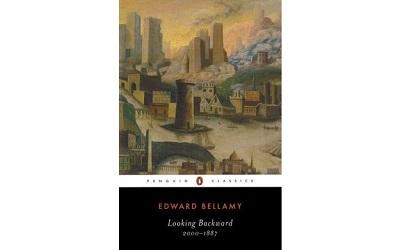Looking Backward to Look Forward: reading Edward Bellamy

Dr Rajiv Prabhakar is a Senior Lecturer in Personal Finance at the OU. In this blog, written for The Open University's History of Books and Reading (HOBAR) Series, hosted by the Institute of English Studies, he talks about his recent reading of the novel Looking Backward 2000-1887 by Edward Bellamy. Rajiv explores Bellamy's attachment to income as a part of wellbeing and links this with his own work, understanding the role universal basic income could play in helping people cope with the economic fall-out from the crisis.
The coronavirus crisis has ushered in its own language. Covid-secure, social distancing, the R rate. These phrases have now become familiar. Some of this language is new but Covid-19 has also revived older words.
Chancellor Rishi Sunak referred to ‘furlough’ when he announced the Coronavirus Job Retention scheme at the outset of the pandemic. I was unfamiliar with this word. But I had to become well acquainted with it as I teach at the Economics Department of The Open University.
As I learnt quickly, furlough referred to providing wages for workers who were temporarily relieved from duties. To stop a mass shedding of labour, the UK government pledged to pay 80% of a worker’s pay (up to a maximum). Furlough changed during the pandemic and is due to end on October 31. There are calls for it to be extended.
The word furlough then turned up in a surprising place. Dismal economic news about how Covid-19 had worsened inequality and job prospects, particularly amongst the young, prompted me to consider alternative visions for the future. I wondered whether utopian or speculative fiction might be a guide, at least for part of the way. I turned to Edward Bellamy’s Looking Backward 2000-1887, first published in 1888, in an effort to look forward.
There is a venerable strand of literary fiction from Thomas More’s Utopia onwards that I could turn for help, but I alighted upon Bellamy as another result of Covid-19. One effect of the pandemic has been to renew calls for a universal basic income to help people cope with the economic fall-out from the crisis. A universal basic income is a regular cash payment provided to all individuals. People would be free to spend a universal basic income as they please with no duty to find work. Thomas More is often cited as one of the forerunners of the basic income idea, but so is Edward Bellamy. I read about Bellamy’s book during the pandemic and then happened to spot it in a local second-hand shop once bookshops began to open. I decided to make it my first lockdown book purchase and then read it.
The novel starts in Boston, United States, in 1887. Its main character is Julian West, a 30 year man who is due to marry Edith Bartlett. Julian is waiting for the completion of his house before he can get married, but his plans are beset by industrial strife. Strikes among labourers halt the building work and induce delirium in Julian. He is put to sleep by a mysterious hypnotist and he wakes in a different world, Boston in the year 2000, in the household of Doctor Leete and his family, including his daughter Edith Leete. This is a new Boston. Conflict, selfishness and poverty have been replaced with harmony, solidarity and plenty.
The word ‘furlough’ appears when Dr Leete describes a world in which incomes are equal. Dr Leete gives the example of an author who gains royalties from a successful work: ‘he has thus a furlough for several months, a year, two or three years, and if he is in the meantime produces other successful work, the remission of services is extended so far as the sale of that may justify’.
Bellamy’s work is dated. His treatment of gender is too narrow. Today, twenty years after his imagined future of 2000, few of the ideas have come to pass. Bellamy imagines a vision of a centrally planned economy that anticipated ‘socialist calculation’ debates during the 1930s in economics. These calculation debates looked at the extent to which a central planner could allocate all resources in society in an efficient and equal manner. Much of economics today is less confident about the capacity of such a central planner.
Looking Backward asks the right questions, even if it does not give all the right answers. My own teaching at The Open University is on personal finance and the importance that Bellamy attaches to income as a part of well-being anticipates much of the current teaching material.
His novel forced me to reflect on the role that stories and narratives can have in making sense of the world and how these can supplement or flesh out economic models. Bellamy was not unique in looking at these issues at the time. Within political economy, writers as diverse as Henry George and Andrew Carnegie were looking at inequality and trying to resolve a labour-capital issue. Literature such as William Morris’ News from Nowhere was doing similar things. But the unexpected echo I found in my reading of Bellamy, caused by the onset of the pandemic, reminded me that imagination is often a precondition for change.
Read the original blog on the Institute of English Studies website
Request your prospectus
![]()
Explore our qualifications and courses by requesting one of our prospectuses today.